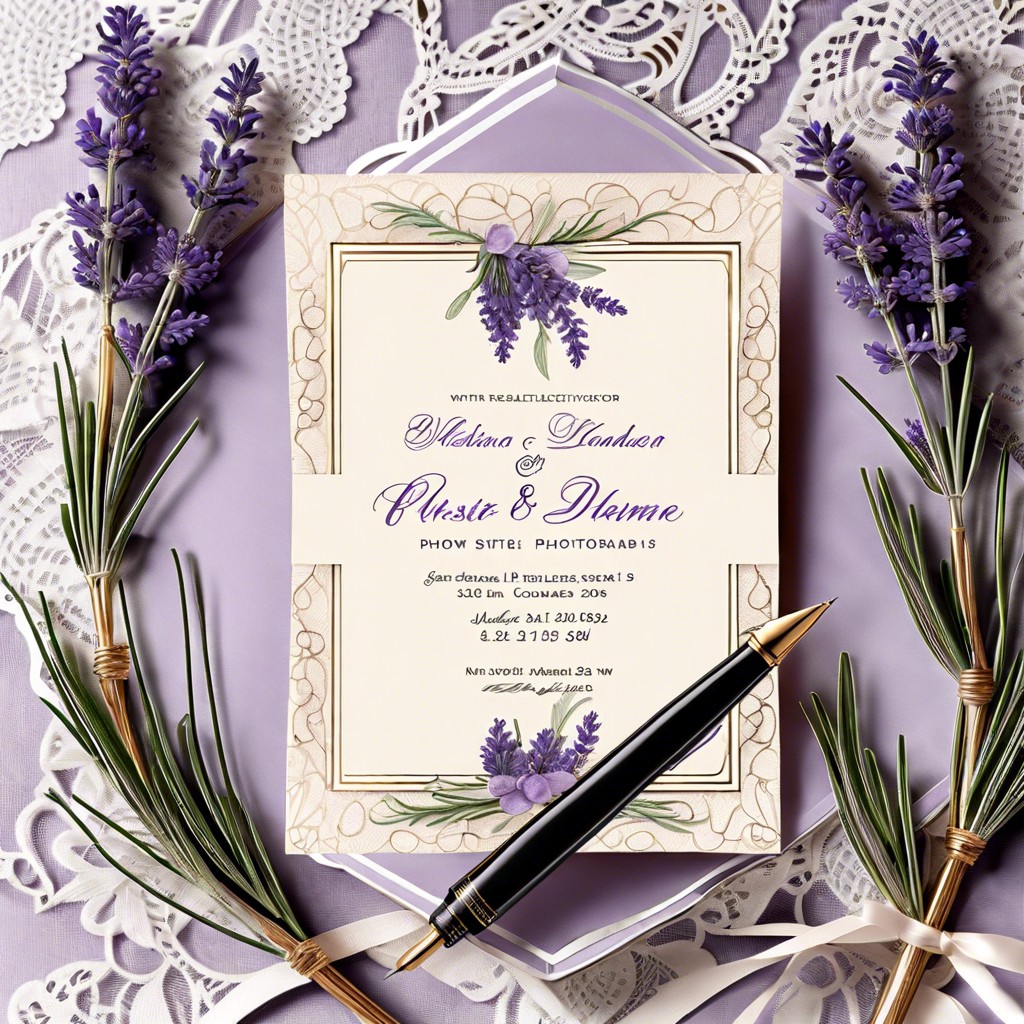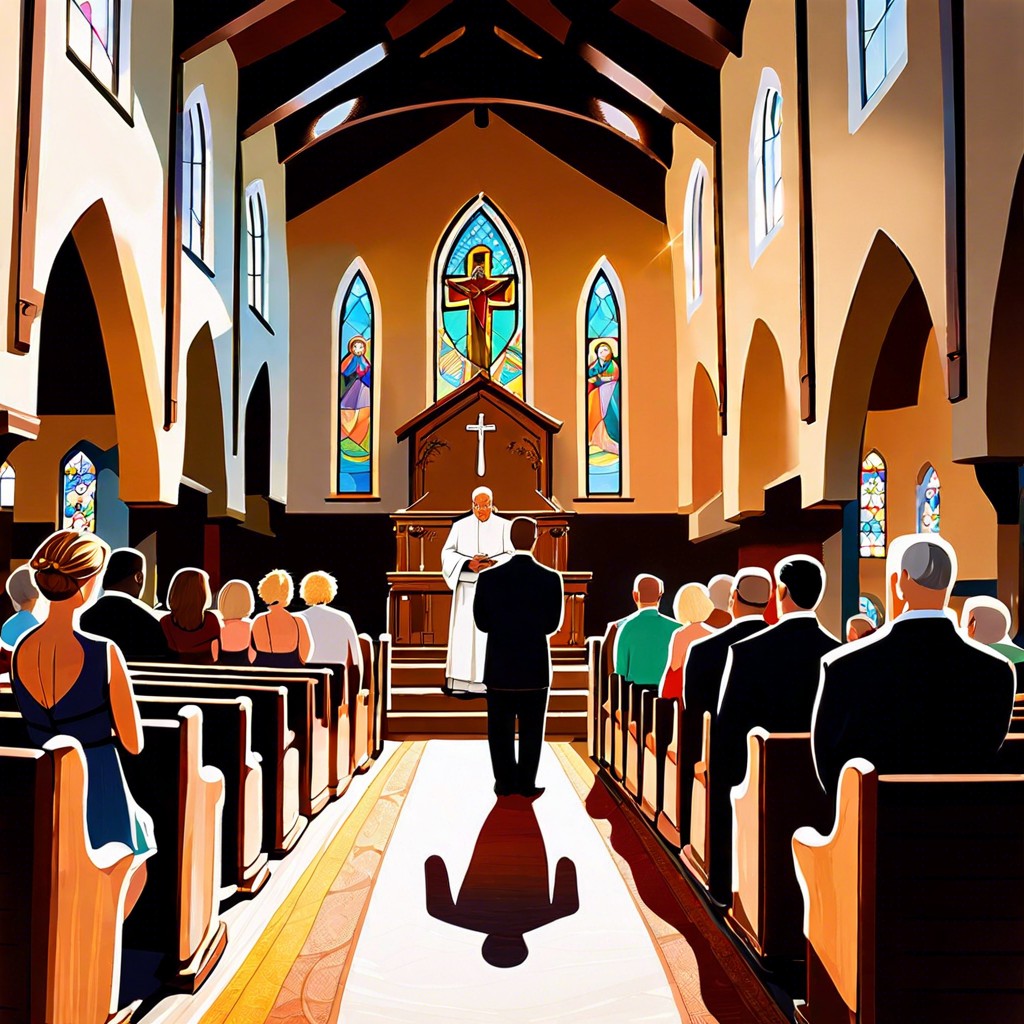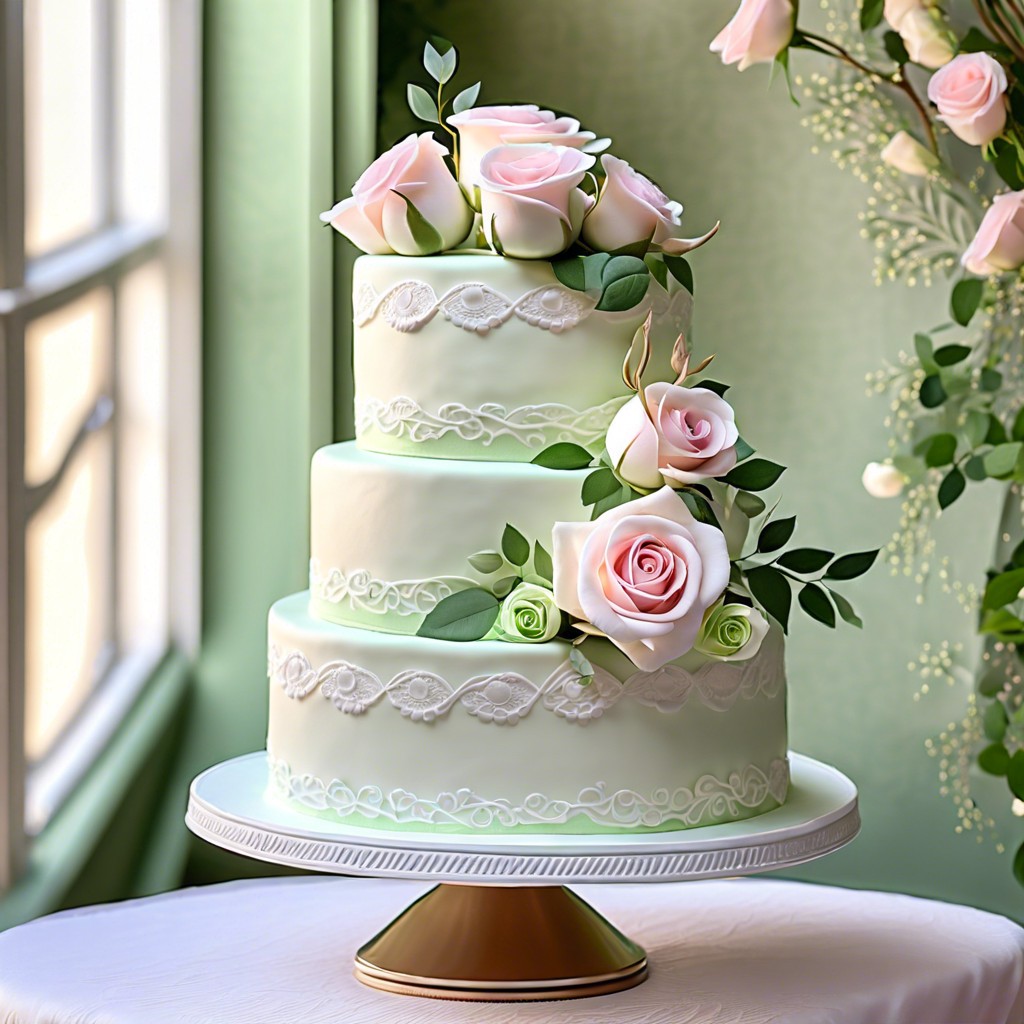Discover the beauty and solemnity of outdoor Catholic weddings as we delve into every detail, from choosing the perfect location to understanding unique traditions.
Outdoor Catholic weddings blend the sacred traditions of the Church with the beauty of nature, creating a uniquely spiritual and serene ambiance.
This article is your comprehensive guide to planning an outdoor Catholic wedding, covering everything from obtaining necessary permissions, selecting an appropriate venue, setting up an altar, to incorporating Catholic rituals in an open-air setting.
Whether you’re looking for ways to respect liturgical norms or seeking inspiration for nature-infused décor and music, you’ll find all the details right here.
Prepare to embark on a journey that harmoniously intertwines faith and nature for your special day.
Understanding Outdoor Catholic Weddings

Outdoor Catholic weddings offer couples the opportunity to take their sacred vows in a tranquil and aesthetically pleasing environment. By moving the ceremony from the traditional four-walled church to the charm of the great outdoors, couples can enhance the divine experience while still adhering to the intrinsic rituals that mark the Catholic faith. The magnificence of nature becomes a beautiful backdrop, setting a serene and riveting scene for the Holy Matrimony.
Despite the change in location, the fundamental elements of a Catholic wedding remain unchanged. The sacrament, the blessings, liturgy, exchange of vows, and inclusion of traditional Catholic rituals are still observed in full. However, this unconventional setting raises certain considerations and demands careful planning to ensure the sanctity and solemnity of the ceremony, as recognized by the Catholic Church.
Can Catholics Get Married Outdoors? Requirements Explained

The Catholic Church traditionally prefers weddings to take place inside a church; however, exceptions can be made with proper permission.
This process requires consultation with your parish priest, who will guide you through the steps needed to get a dispensation, a form of official permission granted by the Church.
The decision is made on a case-by-case basis and usually involves the local bishop.
It’s crucial to make these arrangements well in advance, as it may take time.
Also, remember the Church’s focus remains on the sacrament of marriage and not on the venue.
Obtaining Church Permission

Securing permissions from the Church is a crucial step. Typically, Catholic weddings are held within a church, but with special permission from the bishop, an outdoor wedding can be possible.
Contact your local diocese to discuss your intentions and understand the required processes. You will need to prepare a compelling reason why you desire an outdoor ceremony instead of the traditional church setting.
The bishop will review your request and, if deemed appropriate, may grant a dispensation for your open-air ceremony. In addition, ensure the priest presiding over your wedding agrees to the outdoor setting.
Take note that requirements may vary across different dioceses, entailing that this process should be initiated well in advance.
Choosing an Outdoor Venue

When selecting your location, consider both its physical beauty and practical elements.
Open spaces with natural canopies like parks, vineyards, or beachfronts typically make for stunning backdrops.
However, ensure the site is accessible for all guests – including those with disabilities.
Check for facilities like restrooms, parking, and check the possibility of setting up a tent in case of adverse weather.
A site visit with your priest can also be beneficial in gauging the logistical feasibility according to the Catholic rites.
Don’t forget to get a clarity on local rules and regulations to avoid unexpected glitches on the day.
Every decision made should be in line with creating a serene, sacred space for the wedding ritual while keeping in mind the comfort and safety of your guests.
Setting the Altar Outdoors

In an open-air setting, creating a solemn space for the liturgy is crucial. For outdoor Catholic weddings, the altar should be clearly designated, reverently decorated, and preferably positioned away from distracting elements.
Consider utilizing natural elements like wood to resonate with the surroundings, while still upholding the sacredness of the altar.
Incorporate symbols of Catholic faith, such as a crucifix or candles, in the altar design. However, remember to consult with your parish priest to ensure that any décor matches liturgical norms.
Additionally, it is also essential to have seating for the wedding party and the priest near the altar area. Handling practical aspects like ensuring the altar, and its surroundings, are on even ground can prevent unwanted mishaps during the ceremony.
Planning the Wedding Mass

Navigating the components of a Catholic wedding mass, particularly in an outdoor setting, necessitates careful preparation.
Typically, a full Mass includes an entrance procession, liturgy of the word, rite of marriage, communion, and final blessing.
For an outdoor wedding Mass, be sure to arrange for an officiant who’s comfortable conducting the ceremony outside the traditional church environment.
Also, keep in mind the sacraments.
Communion, a key part of the Mass, involves wine and bread, which may require special precautions to handle correctly outdoors.
Lastly, it’s crucial to ensure that everyone present can hear the ceremony.
A sound system might be necessary to amplify the officiant’s voice, especially in large open spaces.
Consult with audio specialists if needed.
Remember, the intention is to honor the solemnity of a Church service while embracing the beauty of nature.
Understanding Catholic Wedding Traditions

Catholic weddings are steeped in rich traditions that add depth and meaning to the ceremony. One of these is the ‘Rite of Marriage’, where the couple expresses their consent, signifying their mutual gift of self.
Another key ritual is the ‘Nuptial Blessing’, a powerful prayer for the couple’s well-being and sanctification.
These liturgical traditions, when performed in an outdoor setting, take on an extra layer of beauty as they get amplified against the backdrop of nature.
Just imagine expressing your vows amidst lush greenery or exchanging rings under a canopy of twinkling stars.
It’s essential to incorporate these traditions in your outdoor wedding plan to maintain the sacramental integrity of a Catholic wedding.
Selecting Readings and Music

Continuing to respect the Catholic tradition while embracing the open-air setting, it’s critical to select readings and music that align with the liturgical norms. Remember, your selections should stimulate spiritual reflection and celebrate the sanctity of marriage.
Turn to the Old and New Testaments for readings. Recommended are verses that speak to love, commitment, unity, and the Christian understanding of marriage. Genesis 2:18-24 and Corinthians 13:4-7 are popular choices for their potent messages about love and companionship.
In terms of music, traditional hymns or spiritual songs should be preferred. Ensure the chosen pieces are approved by your parish. While secular songs can have beautiful lyrics and melodies, they might not be deemed appropriate for a sacred setting. Discuss your selections with your priest to maintain the spiritual and sacramental integrity of the ceremony.
Last but not least, the songs at the altar can blend with ambient sounds in your natural location. Birdsong or gentle rustling leaves can weave into your chosen hymns to create a serene, harmonious soundscape for your wedding.
Preparing for Weather Changes

Weather unpredictability is a significant factor to consider when planning an outdoor wedding. Having a solid plan B ensures a seamless ceremony regardless of the weather.
Rent a tent or marquee not only for rain protection but also for providing shade in case of intense sun. Portable heaters can provide warmth for a surprise cold snap, while fans or parasols can keep guests comfortable during a heatwave.
Make sure to brief your guests about potential weather changes and suggest appropriate attire. Weather considerations should also guide decisions related to food and décor selections.
Lastly, working with vendors who have experience in outdoor settings can help anticipate and mitigate weather-related issues.
Capturing the Ceremony: Photography and Videography

Engaging a professional wedding photographer and videographer experienced with outdoor settings and familiar with Catholic rituals is crucial. The untamed lighting and expansive landscapes can turn shots into masterpieces if used correctly.
Ensure the team knows the key moments in a Catholic ceremony to capture, such as the exchange of vows, lighting of the unity candle, or ring ceremony. Consider a pre-wedding meeting with them at the venue to discuss ideal spots for photos.
Finally, have a ‘Plan B’ for unfavorable weather, like special tents or indoor areas, to safeguard your precious memories.
FAQ
Can a Catholic marriage take place outside?
Yes, a Catholic marriage can take place outside, however, it requires special authorization from bishops who hold a strong concern for maintaining the sacredness of the ceremony.
What happens if you marry outside the Catholic Church?
If a Catholic marries outside the church without the necessary dispensation, the marriage is considered invalid and not recognized by the Church, also placing the person in a state of mortal sin.
Is it OK for a Catholic to attend a non-Catholic wedding?
Yes, it is perfectly acceptable for a Catholic to attend a non-Catholic wedding.
Can a Catholic priest officiate a non-Catholic wedding?
Yes, a Catholic priest can officiate a non-Catholic wedding, provided that there are no impediments to the couple’s marriage and the priest is authorized by the state to perform civil wedding ceremonies.
What are the recommended seasonal considerations for an outdoor Catholic wedding?
For outdoor Catholic weddings, seasonal considerations should include weather conditions (rain in spring, heat in summer, chill in fall and snow in winter) and the necessary adaptations such as tents, heaters, or fans, as well as the timing of the ceremony respecting the Catholic Church’s canonical hours.
How can one incorporate Catholic traditions into an outdoor wedding ceremony?
Incorporating Catholic traditions into an outdoor wedding ceremony can be accomplished by including elements such as the exchange of vows, the giving and receiving of rings, and the nuptial mass performed by a priest in a beautifully decorated alfresco setting.
What type of outdoor venues are traditionally accepted for a Catholic wedding?
A Catholic wedding traditionally requires a consecrated space such as a church, but some dioceses may allow ceremonies in other sacred spaces or outdoor areas with special permissions.



